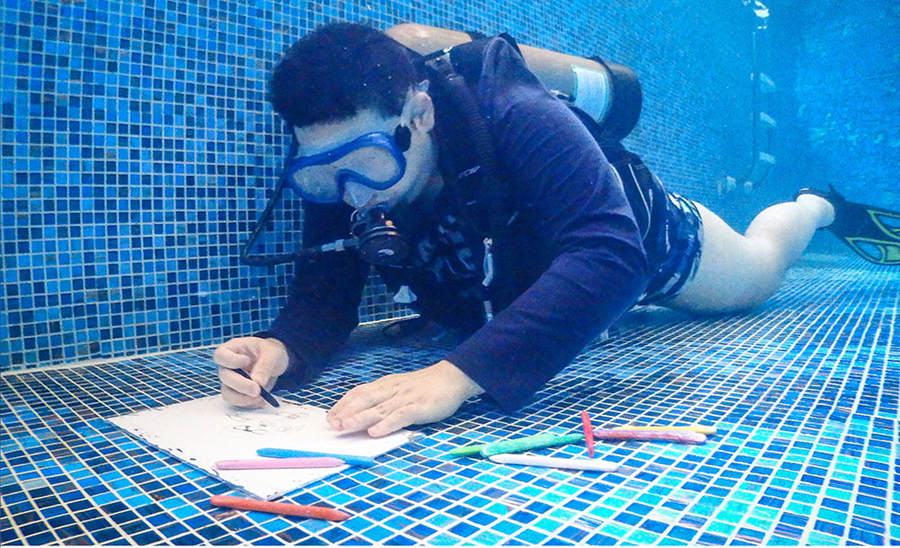


A student with autism draws underwater in Guangzhou. Photo provided to China Daily
Progress
Even when faced with skepticism, Chan never thinks of giving up.
"Although I'm not a therapist and no research has been conducted on the effects of diving, my students are making progress. They want me to give more classes, so I will carry on," he said.
About 60 students have participated in the scuba diving program, which is free for most of them. Around 70 percent of the students are ages 16 to 20.
Thanks to financial help from the Times Foundation, a charity in Guangzhou, Chan and his students can take diving classes at a community swimming pool in the city's Panyu district.
He takes a four-hour bus ride from Hong Kong to the city every Monday and returns to Hong Kong every Friday to spend weekends with his family.
"The high-speed train is amazing; it only takes 90 minutes to get back home from Guangzhou, but it's expensive. I only take the high-speed train when I'm in a hurry," he said.
For Liao and Yonghao, the diving classes are like therapy sessions that make up for the lack of community care.
Yonghao, now 22, has been promoted to the role of assistant instructor at the diving sessions. He takes care of the younger children while continuing his own training.
Liao is still learning from her weekly discussions with Chan, and she shares what she has learned with other parents.
After Yonghao had been taking the diving classes for about a year, she asked him during their regular nightly chat, "Can you forgive me for not spending very much time with you when you were little?" He replied, "Yes, I forgive you, mom."
For Liao, his answer spoke volumes. While she doesn't expect Yonghao to enjoy the prospects open to other young men, it's enough that they can now live together happily.
 |

 Award-winning photos show poverty reduction achievements in NE China's Jilin province
Award-winning photos show poverty reduction achievements in NE China's Jilin province People dance to greet advent of New Year in Ameiqituo Town, Guizhou
People dance to greet advent of New Year in Ameiqituo Town, Guizhou Fire brigade in Shanghai holds group wedding
Fire brigade in Shanghai holds group wedding Tourists enjoy ice sculptures in Datan Town, north China
Tourists enjoy ice sculptures in Datan Town, north China Sunset scenery of Dayan Pagoda in Xi'an
Sunset scenery of Dayan Pagoda in Xi'an Tourists have fun at scenic spot in Nanlong Town, NW China
Tourists have fun at scenic spot in Nanlong Town, NW China Harbin attracts tourists by making best use of ice in winter
Harbin attracts tourists by making best use of ice in winter In pics: FIS Alpine Ski Women's World Cup Slalom
In pics: FIS Alpine Ski Women's World Cup Slalom Black-necked cranes rest at reservoir in Lhunzhub County, Lhasa
Black-necked cranes rest at reservoir in Lhunzhub County, Lhasa China's FAST telescope will be available to foreign scientists in April
China's FAST telescope will be available to foreign scientists in April